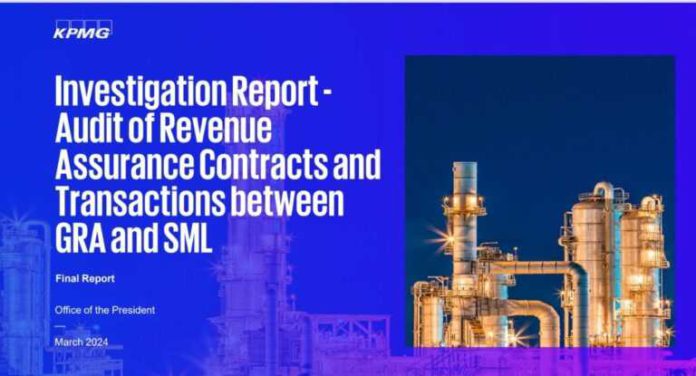President Akufo-Addo has released the full report on the KPMG audit on the contract between the Ghana Revenue Authority (GRA) and Strategic Mobilisation Limited (SML).
This release follows weeks of calls for transparency and accountability regarding the contract’s details and execution.
The President on January 2 commissioned KPMG to audit the contract with an initial deadline of January 16, 2024, later extended to February 23, 2024.
According to the audit findings, SML received a total of GH¢1,061,054,778.00 from 2018 to the present while partially fulfilling its obligations.
The report also noted that SML’s work had contributed to increased revenue in the downstream petroleum sector.
Contrary to the audit report’s claims, SML has disputed receiving GH¢1,061,054,778.00 for its contract with the GRA, arguing that KPMG cited the figure “without reference to the investments made and the taxes paid” during the review period.
On May 8, the Presidency declined a Right to Information (RTI) request by the Media Foundation for West Africa (MFWA) seeking the full KPMG audit report.
Below is a summary of KPMG’s key findings on Needs Assessment
Rationale for Procurement of Services without Needs Assessment
Section 21 of the Public Procurement Act, 2003 (Act 663) as amended with Act 914 (“Act 663 as amended”) requires a procuring entity to prepare a procurement plan to support its approved programme. The Act does not explicitly require a needs assessment to be performed by the procuring entity. Nevertheless, the World Bank Guide to Assessing Needs (2012) and the Chartered Institute of Procurement and Supply’s 13-point Procurement Cycle recommends that entities should:
1. Conduct a needs assessment, i.e., a systematic study of a problem or innovation, incorporating data and opinions from varied sources, to make effective decisions or recommendations about what should happen next
2. Define the problem to be solved, which may be part of an entity’s procurement plan or may be a collection of source materials used to build the procurement requirements.
We enquired from MoF and GRA to ascertain and understand policy directions, needs assessment/ feasibility studies/ proposals that were performed or submitted, enabling GRA to execute contracts with SML
The responses we received from MoF and GRA were premised on the case that, independent third-party monitoring of liftings would enhance petroleum revenue, given prevailing operational inefficiencies, particularly in price verification of imported goods and the monitoring of downstream petroleum products liftings, payment reconciliation and general sense of tax leakages.
This same perception of revenue loss from leakages in the upstream petroleum and the minerals sectors prompted the expansion of the scope of the contracts to cover these sectors as well.
These concerns and challenges that influenced the various contracts with SML were however not technically analysed, documented, nor discussed by GRA with relevant state agencies if any, to adopt a common solution to address the perceived lapses in the classification and valuation of imported goods, price verification of imported goods, downstream, upstream petroleum and minerals sectors, for an inter-ministerial/ agency approach towards a coordinated resolution.
Rationale for Procurement of Services without Structured Needs Assessment
In the absence of a specifically commissioned and purposed needs assessment report, we sighted pockets of standalone industry analysis and reports, which were issued post-GRA’s contracting date with SML that provided elements of expressed needs.
These reports, which highlighted the existence of challenges and tax revenue losses in the petroleum downstream sector included:
a) The 2018 Ghana Chamber of Bulk Oil Distributors (CBOD”) industry reports indicated under-reporting of revenue in the downstream sector
b) Ernst and Young (EY”) audit report issued in May 2021, which was commissioned by GRA to study potential revenue leakages in the downstream petroleum sector for the period 2016 to 2018, established key findings on revenue shortfalls within the downstream sector. The EY report highlighted key findings such as:
i Inconsistencies in reported petroleum liftings by the National Petroleum Authority (NPA”)GRA and Depots
ii. No interface of GRA (GCNet) and NPA systems
iii. Lack of a computerised data collection system at the point of petroleum lifting
iv. Lack of a standardised reconciliation reporting of petroleum imports to petroleum sales.
c) The Revenue Assurance and Compliance Enforcement (“RACE”) of the MoF, whose 2023 report cited under-declaration of taxes in the downstream petroleum and mining sectors.
In respect of the need to extend monitoring services to the upstream and minerals sector, there was no evidence that a technical needs assessment was performed by GRA, nor was an evaluation of the performance of SML at the downstream petroleum sector carried out to inform the expansion of services to those sectors.
ALSO READ:

